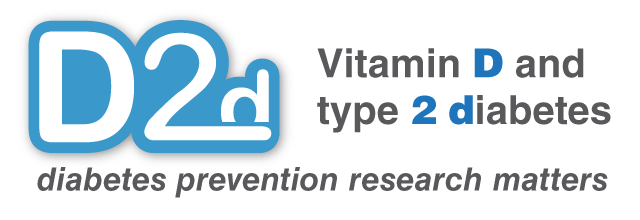About D2d
About D2d
Observational studies have consistently shown that people who have lower blood levels of vitamin D are more likely to develop diabetes. However, it is not known if taking vitamin D supplements lowers risk of developing diabetes. This is an important question because more than 86 million Americans are at high risk of developing diabetes and the prevalence of diabetes and related costs are expected to more than double in the next quarter century. Therefore, simple and sustainable approaches that can be applied at the public health level are needed to lower diabetes risk.
The Vitamin D and type 2 diabetes (D2d) study is a large multi-center clinical trial designed and conducted in twenty-two cities around the United States to determine whether vitamin D supplementation is safe and effective in delaying the onset of type 2 diabetes in people at risk for the disease and to gain a better understanding of how vitamin D affects glucose metabolism.
A total of 2,423 people at risk for diabetes, based on meeting at least two of three glycemic criteria for prediabetes as defined by the 2010 American Diabetes Association guidelines, participated in the study. The participants were randomly divided into two groups: one group took a pill with 4,000 units of vitamin D each day (vitamin D group) and the other group took an identical pill that did not have vitamin D (placebo group). During the study, participants were followed for development of diabetes with blood tests every 6 months and most participants were followed in the study between 2 and 5 years.
The study was designed as an event-driven trial with a target total number of diabetes events of 508. To maximize the study’s ability to observe a treatment effect, participants were asked to refrain from using diabetes-specific and/or weight loss medications during the study and to limit the use of outside-of-study vitamin D to 1000 IU per day from all supplements, including multivitamins.
Approximately one in three U.S. adults age 20 years and older have prediabetes, which is a risk factor for progression to diabetes. Therefore, there’s a continued need for identification of interventions to lower progression to diabetes in populations at high risk. The results of D2d will have extensive public health implications, given that the cost of supplementation with vitamin D is low compared to treating diabetes and its complications.
Study Sponsors
Primary Sponsor

Other Sponsors


